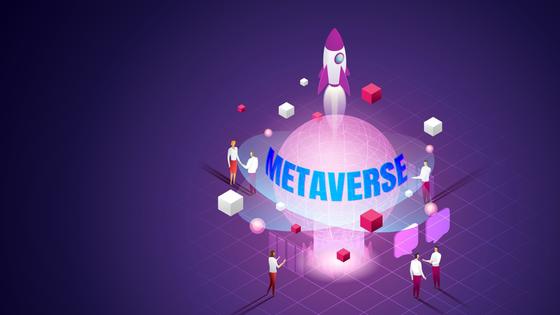Through the Metaverse: How to Open the Way to High Technology for Your Business
Some people dream of travelling to the 19th century to attend lavish banquets and balls, others — to the Middle Ages to see knights' tournaments and ancient kings with their own eyes.

Indeed, some people dream of the distant future with space travel and androids. But I am comfortable in the present. I love our time because only you and I see the blossoming of a new high-tech era, namely the emergence, development, and popularisation of meta universes.
So, a little bit about meta universes, and how to distinguish them from a regular platform

You've probably once wondered or even googled what a metaverse is. To be honest, I have too. So, I'll tell you in simple words: a metaverse is a digital space that mimics the real one with enhanced functions, features, and content with the help of VR and AR technologies. It is a more advanced and perfect version of our world, like in the film "The Matrix", where you can influence what is happening and make it the way you want to see it. That's why a meta universe is usually not limited to one platform. It's a whole network or ecosystem of applications, services, and products. It's also called the "3D Internet." Each person creates their avatar to use a particular metaverse and then goes ahead and generates content, socialises, or has fun! All that is needed is a virtual helmet or 3D glasses.
A metaverse, unlike conventional games or workspaces, has a few distinctive qualities:
- All actions occur in real time and cannot be cancelled or overwritten.
- There are unlimited users in the meta universe, and behind every avatar, there is a real person!
- It has its internal economy - some metaverses like Sandbox have their currency (most often crypto), which you can convert into real currency and thus monetise your "second life."
- There is a strong connection between the digital world and the real world. That is, the metaverse cannot exist in isolation, objects from the real world penetrate the virtual world and vice versa. Users interact with them and with each other, and brands also move back and forth and represent themselves in the digital space (which we will discuss separately below).
- Users create content and develop the metaverse, not only consume the already created content. Thus, every true metaverse is a platform for IT developers to create something of their own, from a new item to a new world.
The first point seems particularly impressive, doesn't it? I mean, the meta universe always has a life of its own! Let's say I met a colleague at one of the Mesh coffee shops (a virtual reality created by Microsoft, where you also create your avatar and "walk through different worlds"). Once we've finished negotiating and parted ways, the coffee shop doesn't cease to exist; it continues to be visited by other users. They chat similarly and carry drinks back and forth, etc. When I revisit it a few hours later, the atmosphere may change. For example, it may be dirty, or someone may clean it up. So, it's like leaving a real café - it will continue to work and live, but if you break something there, you won't be able to rewind time.
Top ideas about what to do with the metaverse in business

If you are an entrepreneur or manager like me, you probably naturally wonder: "How can I use all this for the benefit of my company and make additional profit?" After all, the metaverse seems to be about fun and leisure entertainment. But it's more than that! Many international companies have already adopted them and have raised audience engagement and sales tremendously. That's why we at Lectera have launched our new course, "Metaverse for All: Dive into the Digital Realm," where an expert in metaverses will answer all your questions about their possibilities and functions for business.
In the meantime, I will share some examples from marketing and brand building that I was particularly impressed by. For example, Nike's adverts have already become legendary. The company used the famous Roblox video game metaverse to replicate a copy of its headquarters. It's called Nikeland, and users can visit it to compete in sports mini-games, win honours in tournament rosters and even get digital prizes. Lego has done something similar - developing a "safe and engaging environment for kids" with the computer game development company Epic Games.
Many brands are also starting to open digital copies of their shops in meta universes and sell digital or even actual items that can be delivered to the customer's address after the order gets placed. Gucci, for example, has created a kind of "virtual fitting room" where any user can try on their Gucci Virtual 25 model using augmented reality and wear it as their avatar in any Roblox-based game. The company has also opened a replica of the Florentine Gucci Garden installation in Roblox, so you can now visit online.
My favourite brand, Louis Vuitton, has designed skins for League of Legends characters! That is, each user can purchase and wear a unique "look" designed by elite designers in the game. Similarly, Gucci teamed up with Tennis Clash to launch exclusive fashion outfits for users, and another famous fashion house, Balenciaga, even launched a video game called "Afterworld" to showcase their autumn collection in 2021. As part of the game, users had to explore a post-apocalyptic world, which also featured a location in the form of an abandoned Balenciaga shop.
Another business opportunity that meta universes offer is influencers and models. Imagine if your brand would be advertised by, say, Harry Potter! The same applies, for example, to vocaloids, that is, virtual singers who have social media pages and a solid fanbase, like Hatsune Miku or Lil Miquela. In other words, you can collaborate with virtual models and people like full-fledged actors or bloggers. Nevertheless, the money you must pay them is real!
Also, in the meta universe, you can place your outdoor advertising on street billboards and signboards as you do offline. To do this, you buy a virtual place online, for example, in the centre of a digital city or on the screen of a digital sports match. Since metaverses involve functionality and opportunities for interaction, as in video games, everything here is limited only by your budget and the marketer's imagination. Moreover, it most often turns out to be cheaper than holding similar events online. For example, rapper Travis Scott gave a virtual concert in front of fans in 2020 using the game Fortnite, when it was cancelled in real life due to quarantine measures.
Similarly, you could even launch your virtual education academy, say, creating a copy of Lectera! Students using avatars would then be able to attend classes and learn online. Originally, meta universes were used by many companies as a solution to problems of geographical remoteness or social constraints. It's a way to lead an active life from the comfort of your home, sell products, attract customers, or hold full trade shows.
Here are some tips to keep in mind if you want to open the right doors to the metaverse for your business:
- Link the metaverse to the actual processes within the company. You need a point of contact between the two, which you integrate from one space to another. The real and virtual businesses need to synchronise. You must connect your CRM system, POS terminals, electronic payments, etc. Also, don't forget to collect data from the virtual world: just like in real life, you can track which products users pay more attention to, where they linger when 3D-viewing, etc.
- Make sure that your virtual goods correspond to the real ones. Try to meet user expectations! I understand the temptation to "embellish" and make digital versions look better than they are. But if you're advertising a product, or even more so if you're offering to try something on to pay for it in real life, honesty is paramount.
- Automate, but don't "throw" live people out of the process. According to a Foresight Factory survey, about 70% of consumers prefer to be served by a human, especially if it's about some product issues. So even in the virtual world, take care of your salespeople's avatars and don't forget about the quality of service in the real world.
The meta universe does blur the boundaries between reality and our imagination. Still, it is imperative to maintain the balance between business, marketing, and customers. Yes, you can crank your creativity to the max and realise even the craziest ideas but don't lose ground and forget that real input, investment, and relationships are still more critical. And then, who knows, maybe we will go grocery shopping wearing 3D glasses instead of a jacket soon?
Share this with your friends via:
Latest News

A significant stage in the development of the alternative education system has begun in West Northamptonshire in the UK: the County Council is actively calling on parents, guardians, and trustees to participate in shaping the future of this key area.

Outwoods Primary School in Atherstone, Warwickshire, having experienced deep sadness after the loss of their famous cat, Silla, has found solace in a new pet – a Maine Coon named Aloysius O’Hara.

In modern universities, artificial intelligence, and in particular ChatGPT, is rapidly transforming from a controversial tool into a full-fledged student assistant.

An innovative educational project is gaining momentum in UK primary schools, aiming to change attitudes towards video games.

The Massachusetts Institute of Technology (MIT) presents MIT Learn – a revolutionary online platform that opens a “new front door” to access university knowledge and resources.












 Test: How Psychologically Mature Are You? Check Your Inner Foundation.
Test: How Psychologically Mature Are You? Check Your Inner Foundation.
 Test. Check Your Social Media Dependency Level!
Test. Check Your Social Media Dependency Level!
 Test: What Business is Right For You?
Test: What Business is Right For You?
 Test: How Prone Are You to Abusive Behavior as a Manager?
Test: How Prone Are You to Abusive Behavior as a Manager?
 Test. What superpower would you possess if you were a superhero?
Test. What superpower would you possess if you were a superhero?
 Test. What Should You Let Go of Before Winter Ends?
Test. What Should You Let Go of Before Winter Ends?
